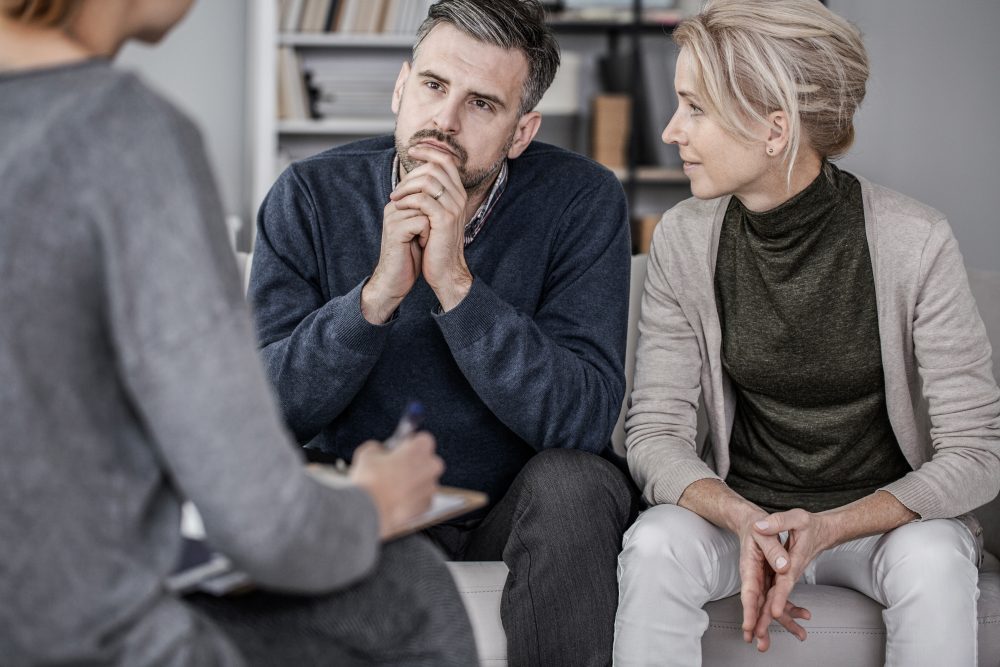Couples Therapy: Working Between People
The Basic Assumption.
Couples therapy goes on the assumption that there are personal and social forces binding a couple together that are stronger than the forces tearing them apart. Forming intimate bonds within couples is very important in the lives of most human beings because these bonds are the nucleus of a safe and comfortable home. Without intimacy, privacy, and personal connectedness within couples and families, many of the activities of social life become meaningless and even frightening.

The Negative Dynamic.
However, familiarity can be its own worst enemy. Familiarity within couples is the breeding ground of habit. Left on their own, in the privacy of their homes, many couples develop habits of “negative dynamics” or cycles which make it difficult for them to communicate. These are self-perpetuating habits of communication or action that produce anger, where the anger leads to repetition of the pattern which leads to more anger. Often the triggers for negative dynamics are in details of the lives or history of the people in the couple which remain frightening, humiliating so that when they are brought up the reaction is predictable. The only person who can trigger these negative dynamic cycles is the one who knows them best.
Negative dynamics are rarely real grounds for the dissolution of a relationship, but continuous negative experience can generate false and self-destructive conclusions. Things get more complicated fast. People find themselves entrapped in false solutions. Couples sometimes separate or seek emotional connections elsewhere, in spite of the bonds of affection and history that remain between them. Sometimes the patterns of anger generation grow into obsessions, self-destructive relationships outside of the couple, even substance abuse, intensive use of pornography and odd ruses that fall through. Many of the actions of broken-hearted couples trapped in the emotional whirlwind are really poorly thought-out schemes to recover the relationship.
Interpersonal Dysfunction.
Negative dynamics are a kind of personal or psychological problem that is larger than one person. They represent a form of dysfunction that exists between people. Therapy or counseling for one member of the couple can’t be a complete treatment. Couples therapy is the only potential form of helping process.
The couples therapist finds ways of turning off negative dynamics patterns. There is no one pattern of treatment. The elements of couples therapy are similar to the elements of counseling or therapy for other forms of emotional dysfunction but focused on relationships. It has to do with disentanglement of interpersonal knots. The counselor stands apart and dispassionately identifies the pattern.
Couples Therapy.
Therapists vary in their methods. Many couples therapists have developed intricate theories, some have to do with putting the couple’s problems into a typology. There are no simple solutions. The principle action of the therapist is to identify the destructive pattern and then to employ the power of the affectional bond that originally bound the couple together to drive solutions. The assumption is that the bond is kind of fuel that can power change.
In the therapy of dysfunctions that lay between people, not in any one person, the therapist has to make sure both members of the couple participate together. The therapist stands as an independent, non-judgemental broker. The couples session should be perceived as the safe place where each member of the couple can be heard by the therapist and by the other without triggering the negative dynamic which has so damaged their communication. As the couple tells their history together, the nature of the issue is often revealed and solutions begin to form. This can be an organic process of talking and interacting in a supportive environment. Ways around the destructive triggers are often worked out under the condition of continued mutual affection and regard.
Family Restoration Counseling Services offers individual, couples, family and group therapy in the Greater Dallas area for children, adolescents and adults. Please contact us to learn more.
